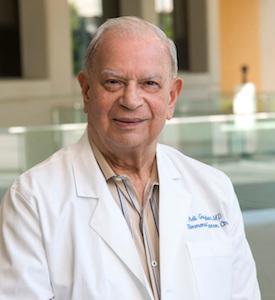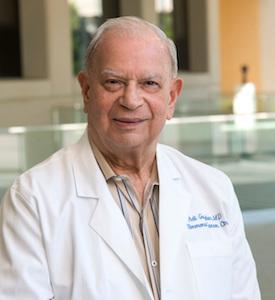
Credit: UT Southwestern
DALLAS – Dec. 6, 2016 – Researchers at UT Southwestern Medical Center have found a new biomarker for glioma, a common type of brain cancer, that can help doctors determine how aggressive a cancer is and that could eventually help determine the best course of treatment.
Researchers from the Harold C. Simmons Comprehensive Cancer Center found that high expression of a gene called SHOX2 predicted poor survival in intermediate grade gliomas.
"As an independent biomarker, SHOX2 expression is as potent as the currently best and widely used marker known as IDH mutations," said Dr. Adi Gazdar, Professor of Pathology in the Nancy B. and Jake L. Hamon Center for Therapeutic Oncology and a member of the Simmons Cancer Center.
According to the National Cancer Institute, cancers of the brain and nervous system affect nearly 24,000 people annually. In 2013, there were an estimated 152,751 people living with brain and other nervous system cancer in the United States. The overall 5-year survival rate is 33.8 percent.
Knowing the probable survival status of an individual patient may help physicians choose the best treatment.
In combination with IDH mutations or several other biomarkers, SHOX2 expression helped to identify subgroups of patients with a good prognosis even though other biomarkers had predicted a bad prognosis.
"Our findings are based on analysis of previously published studies. They will have to be confirmed in prospective studies, and their clinical contribution and method of use remain to be determined," said Dr. Gazdar, who holds the W. Ray Wallace Distinguished Chair in Molecular Oncology Research.
The findings are published in EBiomedicine.
###
This work in brain cancer research is supported by the National Institutes of Health.
Long-term goals of Dr. Gazdar's lab are to the determine molecular and genetic basis of human cancers, and to develop molecular insights to provide prognostic and diagnostic therapies in the treatment of human cancers. A former researcher at the National Cancer Institute, Dr. Gazdar's efforts there and at UT Southwestern have resulted in the collection and analysis of more than 2,500 human tumor specimens as well as the establishment of more than 400 lung, breast, ovary, and other types of tumor cell lines.
Additional UT Southwestern researchers who contributed to the current study include Dr. Yu-An Zhang, Instructor in the Hamon Center for Therapeutic Oncology Research; Dr. Yunyun Zhou, Computational Biologist in the Department of Clinical Sciences; Dr. Xin Luo, Data Scientist in the Department of Bioinformatics; Dr. Luc Girard, Assistant Professor in the Hamon Center for Therapeutic Oncology Research; and Dr. Guanghua Xiao, Associate Professor in the Department of Clinical Sciences and a member of the Simmons Cancer Center.
The Harold C. Simmons Comprehensive Cancer Center is the only NCI-designated Comprehensive Cancer Center in North Texas and one of just 47 NCI-designated Comprehensive Cancer Centers in the nation. Simmons Cancer Center includes 13 major cancer care programs. In addition, the Center's education and training programs support and develop the next generation of cancer researchers and clinicians. Simmons Cancer Center is among only 30 U.S. cancer research centers to be designated by the NCI as a National Clinical Trials Network Lead Academic Participating Site.
About Gliomas
Generally speaking, gliomas arise due to aberrations in normal brain cells. Depending on the nature of the aberration, the glioma can be fast- , intermediate- or slow-growing. Gliomas do not metastasize or travel to other parts of the body. Patients with gliomas commonly present with headaches, seizures, weakness, or vision changes.
Decades ago, patients were treated with aggressive regimens that resulted in significant side effects without an improvement in the quantity or quality of life. Today, treatments for gliomas are much more sophisticated. Because scientists have a better understanding of the underlying biology and genetics of gliomas, physicians are able to tailor treatments to maximize effectiveness while minimizing unwanted side effects.
Treatments
Source: UTSW
About UT Southwestern Medical Center
UT Southwestern, one of the premier academic medical centers in the nation, integrates pioneering biomedical research with exceptional clinical care and education. The institution's faculty includes many distinguished members, including six who have been awarded Nobel Prizes since 1985. The faculty of almost 2,800 is responsible for groundbreaking medical advances and is committed to translating science-driven research quickly to new clinical treatments. UT Southwestern physicians provide medical care in about 80 specialties to more than 100,000 hospitalized patients and oversee approximately 2.2 million outpatient visits a year.
This news release is available on our website at http://www.utsouthwestern.edu/news.
To automatically receive news releases from UT Southwestern via email, subscribe at http://www.utsouthwestern.edu/receivenews.
Media Contact
Lori Sundeen Soderbergh
[email protected]
214-648-3404
@UTSWNews
http://www.swmed.edu
############
Story Source: Materials provided by Scienmag





